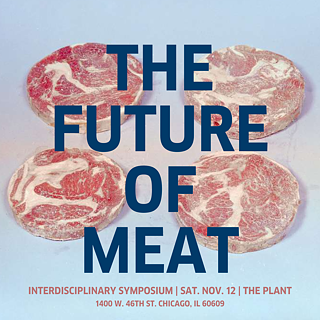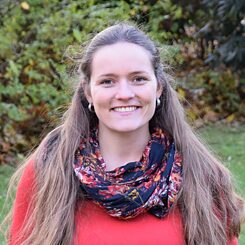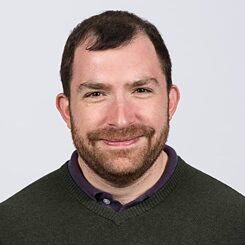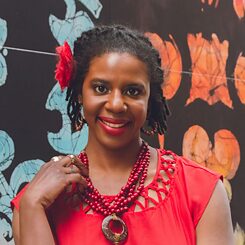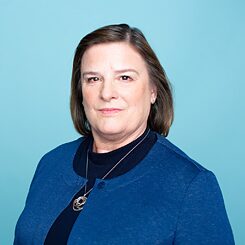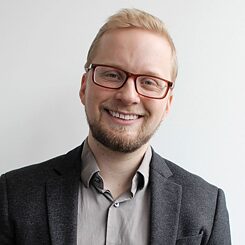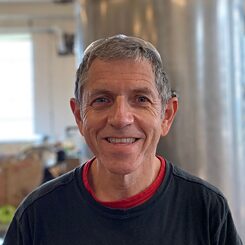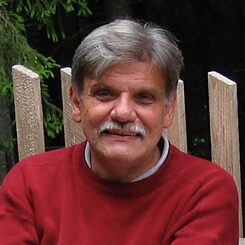The Future of Meat
Symposium
-
The Plant, Chicago
- Language English
- Price Free and Open to the Public

We are denizens of a warming planet, and meat—beef in particular—accounts for nearly 60% of all greenhouse gases from food production. The health impacts of meat consumption are both global and personal: while lean meat has been shown to have some health benefits, processed meat is so harmful that the WHO ranks it alongside known carcinogens like tobacco and alcohol in its likelihood of causing cancer. And as individuals, we must grapple with our own cultural, religious, and ideological reasons both to eat meat and to abstain from it.
What has changed in our relationship to meat – and what needs to change?
Convening speakers whose perspectives are informed by religious ethics, environmental policy, critical animal studies, and the science of creating alternative meat, this event will consider the impacts of the meat industry and suggest alternatives for its future.
Register here
This day-long symposium is organized in partnership with Bubbly Dynamics LLC, owner and operator of the former meatpacking facility now known The Plant.
SYMPOSIUM SCHEDULE
LECTURE PROGRAM
2:00pm
Food Security and Climate Justice: The Meat of the Matter
Virtual Keynote Address (on-site)
Lisa Tostado, Former Head of Programme for Climate, Agriculture and Trade at the European Union office of the Heinrich-Böll-Stiftung in Brussels
3:00pm
The Chicago Stockyards, Packingtown, and the Modern Meat Industry
Jacob Kaplan, Editor and Co-Founder of Forgotten Chicago
4:00pm
Panel Discussion: A Future With(out) Meat
Nekeisha Alayna Alexis, Independent Scholar and Theologian
Dr. Debbie Yaver, Chief Scientific Officer, Nature’s Fynd
Jacy Reese Anthis, Sociologist, Statistician, and PhD Fellow at the University of Chicago
Leonard Lerer, Founder and Chief Scientific Officer, Back of the Yards Algae Sciences (BYAS)
BREAK
5:15pm
Reception with Nature’s Fynd and Back of the Yards Algae Sciences foods
6:00pm
Dinner and drinks available for purchase on-site at The Plant, including pizza at Whiner Beer Co.'s Taproom and MeetStop by Ste. Martaen's vegan comfort food
FILM SCREENING
7:00pm
The Killing Floor (1984)
Introduced by Dominic Pacyga, Ph.D., Professor Emeritus of History, Columbia College Chicago
Based on actual events and characters, this film follows Frank Custer (Damien Leake), a young sharecropper from Mississippi who lands a job on "the killing floor" of a giant Chicago meatpacking plant — one of tens of thousands of Black migrants who journeyed to the industrial north during World War One, hoping for more racial equality. While struggling to bring his wife (Alfre Woodard) and children to Chicago, Frank joins with European immigrant workers in a pioneering effort to build the first interracial union in the Stockyards and is confronted by deadly long-standing racial and ethnic tensions — stoked by management and culminating in the notorious Chicago "Race Riot" of 1919 — as he attempts to unite the workers.
SPEAKER BIOS
Lisa Tostado
Lisa Tostado is the former Head of Programme for Climate, Agriculture and Trade at the European Union office of the Heinrich-Böll-Stiftung in Brussels. As such, she was responsible for issues related to the EU Green Deal and managed the successful Atlas format of the Böll Foundation, including the Meat Atlas from 2021 and the Pesticide Atlas in 2022. She currently works at the Global Gas Hub, where her focus is on bringing down methane emissions. She has previously worked in the food sector as circular economy project officer, as well in international development cooperation at the Deutsche Gesellschaft für Internationale Zusammenarbeit (GIZ) where she focused on topics related to adaptation to climate change impacts. Lisa holds a BA in Political Sciences and Economics from the University of Mannheim and the University of Ottawa, and a MA in Environmental Policy from Sciences Po Paris.
Jacob Kaplan
A lifelong resident of Chicago, Jacob Kaplan is a co-founder of Forgotten Chicago, an organization that uncovers and documents overlooked aspects of that city’s built environment. Jacob is particularly interested in the industrial history of the Chicagoland area, and has given many tours highlighting this heritage. He served on the Packingtown Museum volunteer organizing committee that helped organize and plan the museum. Jacob is the author of numerous articles, and he recently co-authored books on two Chicago neighborhoods, Avondale and Logan Square.
Nekeisha Alayna Alexis
Nekeisha Alayna Alexis is a Trinidad-native and long-time New Yorker who calls Elkhart, Indiana, home and loves the color bright grass green. She received her Bachelor of Arts with a concentration in Africana studies from New York University. She also received her Masters of Arts: Theological Studies from Anabaptist Mennonite Biblical Seminary, where she currently works as Intercultural Competence and Undoing Racism (ICUR) coordinator. As an independent scholar, Nekeisha writes and speaks on a wide range of topics related to human and other animal oppression, with specific attention to intersectionality, Black liberation, and/or Christian theology, ethics and peacemaking. She has been a contributor to several edited collections, including Animaladies: Gender, Animals, and Madness (Bloomsbury 2018) and in The Routledge Handbook of Animal Ethics (2020). She most recently was a primary writer for a year-long lectionary-based devotional that was commissioned by the Anglican Society for the Welfare of Animals and organized in collaboration with the organization, CreatureKind.
Debbie Yaver, Ph.D.
Debbie has expertise in engineering microorganisms for protein and chemical production as well as whole microbe products using synthetic biology and classic approaches like mutagenesis and screening. She also has experience scaling microbes from lab to production and the use of beneficial microbes in applications. Prior to joining Nature’s Fynd in September 2021, Debbie spent two decades at Novozymes where she was Managing Director of the company's site in California as well as Director of Production Strain Technology. She is an inventor on > 40 issued patents; is an author on > 20 peer reviewed publications; serves on several advisory boards; and has been the recipient of multiple awards, including the inaugural Rosalind Franklin Award for Leadership in Industrial Biotechnology from Biotechnology Industry Organization (BIO).
Jacy Reese Anthis
Jacy Reese Anthis is a sociologist, statistician, and co-founder of the Sentience Institute, an interdisciplinary think tank researching long-term social and technological change. His acclaimed 2018 book, The End of Animal Farming, documents the past, present, and future of humanity's transition to animal-free food technologies such as cell-cultured meat. Anthis is currently a PhD Fellow at The University of Chicago. His research has been featured in The Guardian, Vox, Forbes, and other global media outlets, and he has presented at conferences and seminars in over 20 countries. You can reach out to him on Twitter @JacyAnthis.
Leonard Lerer, MBChB, BSc Hons (Epidemiology), MMed (Pathology), MBA
Leonard Lerer is the founder and CSO of Back of the Yards Algae Sciences (BYAS) and an inventor of BYAS sustainable algae and mushroom extraction technology. Leonard has over 20 years of professional experience in life sciences, R&D, entrepreneurial and development finance, and capacity building and has been recognized as a leading innovator in the alternative protein space. Leonard is also an expert on innovative finance for development where his work has included supporting the Global Fund to Fight AIDS, Tuberculosis, and Malaria, World Bank and Gates Foundation with the development of breakthrough financial market products to support health and development.
Dominic A. Pacyga, Ph.D.
Dominic A. Pacyga, Ph.D. has authored, co-authored, or edited eight books on Chicago history including Slaughterhouse: The Chicago Stockyards and the World They Made. He is the curator of the Packingtown Museum and is currently working on a book Clout City dealing with the religious and cultural roots of Chicago’s political machine. Pacyga is Professor Emeritus of History at Columbia College and an Affiliated Faculty Member in the History Department at the University of Illinois at Chicago.
What has changed in our relationship to meat – and what needs to change?
Convening speakers whose perspectives are informed by religious ethics, environmental policy, critical animal studies, and the science of creating alternative meat, this event will consider the impacts of the meat industry and suggest alternatives for its future.
Register here
This day-long symposium is organized in partnership with Bubbly Dynamics LLC, owner and operator of the former meatpacking facility now known The Plant.
SYMPOSIUM SCHEDULE
LECTURE PROGRAM
2:00pm
Food Security and Climate Justice: The Meat of the Matter
Virtual Keynote Address (on-site)
Lisa Tostado, Former Head of Programme for Climate, Agriculture and Trade at the European Union office of the Heinrich-Böll-Stiftung in Brussels
3:00pm
The Chicago Stockyards, Packingtown, and the Modern Meat Industry
Jacob Kaplan, Editor and Co-Founder of Forgotten Chicago
4:00pm
Panel Discussion: A Future With(out) Meat
Nekeisha Alayna Alexis, Independent Scholar and Theologian
Dr. Debbie Yaver, Chief Scientific Officer, Nature’s Fynd
Jacy Reese Anthis, Sociologist, Statistician, and PhD Fellow at the University of Chicago
Leonard Lerer, Founder and Chief Scientific Officer, Back of the Yards Algae Sciences (BYAS)
BREAK
5:15pm
Reception with Nature’s Fynd and Back of the Yards Algae Sciences foods
6:00pm
Dinner and drinks available for purchase on-site at The Plant, including pizza at Whiner Beer Co.'s Taproom and MeetStop by Ste. Martaen's vegan comfort food
FILM SCREENING
7:00pm
The Killing Floor (1984)
Introduced by Dominic Pacyga, Ph.D., Professor Emeritus of History, Columbia College Chicago
Based on actual events and characters, this film follows Frank Custer (Damien Leake), a young sharecropper from Mississippi who lands a job on "the killing floor" of a giant Chicago meatpacking plant — one of tens of thousands of Black migrants who journeyed to the industrial north during World War One, hoping for more racial equality. While struggling to bring his wife (Alfre Woodard) and children to Chicago, Frank joins with European immigrant workers in a pioneering effort to build the first interracial union in the Stockyards and is confronted by deadly long-standing racial and ethnic tensions — stoked by management and culminating in the notorious Chicago "Race Riot" of 1919 — as he attempts to unite the workers.
SPEAKER BIOS
Lisa Tostado
Lisa Tostado is the former Head of Programme for Climate, Agriculture and Trade at the European Union office of the Heinrich-Böll-Stiftung in Brussels. As such, she was responsible for issues related to the EU Green Deal and managed the successful Atlas format of the Böll Foundation, including the Meat Atlas from 2021 and the Pesticide Atlas in 2022. She currently works at the Global Gas Hub, where her focus is on bringing down methane emissions. She has previously worked in the food sector as circular economy project officer, as well in international development cooperation at the Deutsche Gesellschaft für Internationale Zusammenarbeit (GIZ) where she focused on topics related to adaptation to climate change impacts. Lisa holds a BA in Political Sciences and Economics from the University of Mannheim and the University of Ottawa, and a MA in Environmental Policy from Sciences Po Paris.
Jacob Kaplan
A lifelong resident of Chicago, Jacob Kaplan is a co-founder of Forgotten Chicago, an organization that uncovers and documents overlooked aspects of that city’s built environment. Jacob is particularly interested in the industrial history of the Chicagoland area, and has given many tours highlighting this heritage. He served on the Packingtown Museum volunteer organizing committee that helped organize and plan the museum. Jacob is the author of numerous articles, and he recently co-authored books on two Chicago neighborhoods, Avondale and Logan Square.
Nekeisha Alayna Alexis
Nekeisha Alayna Alexis is a Trinidad-native and long-time New Yorker who calls Elkhart, Indiana, home and loves the color bright grass green. She received her Bachelor of Arts with a concentration in Africana studies from New York University. She also received her Masters of Arts: Theological Studies from Anabaptist Mennonite Biblical Seminary, where she currently works as Intercultural Competence and Undoing Racism (ICUR) coordinator. As an independent scholar, Nekeisha writes and speaks on a wide range of topics related to human and other animal oppression, with specific attention to intersectionality, Black liberation, and/or Christian theology, ethics and peacemaking. She has been a contributor to several edited collections, including Animaladies: Gender, Animals, and Madness (Bloomsbury 2018) and in The Routledge Handbook of Animal Ethics (2020). She most recently was a primary writer for a year-long lectionary-based devotional that was commissioned by the Anglican Society for the Welfare of Animals and organized in collaboration with the organization, CreatureKind.
Debbie Yaver, Ph.D.
Debbie has expertise in engineering microorganisms for protein and chemical production as well as whole microbe products using synthetic biology and classic approaches like mutagenesis and screening. She also has experience scaling microbes from lab to production and the use of beneficial microbes in applications. Prior to joining Nature’s Fynd in September 2021, Debbie spent two decades at Novozymes where she was Managing Director of the company's site in California as well as Director of Production Strain Technology. She is an inventor on > 40 issued patents; is an author on > 20 peer reviewed publications; serves on several advisory boards; and has been the recipient of multiple awards, including the inaugural Rosalind Franklin Award for Leadership in Industrial Biotechnology from Biotechnology Industry Organization (BIO).
Jacy Reese Anthis
Jacy Reese Anthis is a sociologist, statistician, and co-founder of the Sentience Institute, an interdisciplinary think tank researching long-term social and technological change. His acclaimed 2018 book, The End of Animal Farming, documents the past, present, and future of humanity's transition to animal-free food technologies such as cell-cultured meat. Anthis is currently a PhD Fellow at The University of Chicago. His research has been featured in The Guardian, Vox, Forbes, and other global media outlets, and he has presented at conferences and seminars in over 20 countries. You can reach out to him on Twitter @JacyAnthis.
Leonard Lerer, MBChB, BSc Hons (Epidemiology), MMed (Pathology), MBA
Leonard Lerer is the founder and CSO of Back of the Yards Algae Sciences (BYAS) and an inventor of BYAS sustainable algae and mushroom extraction technology. Leonard has over 20 years of professional experience in life sciences, R&D, entrepreneurial and development finance, and capacity building and has been recognized as a leading innovator in the alternative protein space. Leonard is also an expert on innovative finance for development where his work has included supporting the Global Fund to Fight AIDS, Tuberculosis, and Malaria, World Bank and Gates Foundation with the development of breakthrough financial market products to support health and development.
Dominic A. Pacyga, Ph.D.
Dominic A. Pacyga, Ph.D. has authored, co-authored, or edited eight books on Chicago history including Slaughterhouse: The Chicago Stockyards and the World They Made. He is the curator of the Packingtown Museum and is currently working on a book Clout City dealing with the religious and cultural roots of Chicago’s political machine. Pacyga is Professor Emeritus of History at Columbia College and an Affiliated Faculty Member in the History Department at the University of Illinois at Chicago.
Location
The Plant
Packingtown Museum
1400 W 46th St.
Chicago 60609
USA
Packingtown Museum
1400 W 46th St.
Chicago 60609
USA
Location
The Plant
Packingtown Museum
1400 W 46th St.
Chicago 60609
USA
Packingtown Museum
1400 W 46th St.
Chicago 60609
USA
